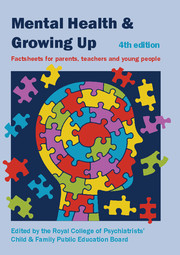Book contents
- Frontmatter
- Contents
- Contributors
- Factsheets for young people
- 1 Bipolar disorder
- 2 Cannabis and mental health
- 3 Cognitive–behavioural therapy (CBT)
- 4 Coping with stress
- 5 Depression
- 6 Drugs and alcohol
- 7 Exercise and mental health
- 8 Mental illness in a parent
- 9 Obsessive–compulsive disorder (OCD)
- 10 Psychosis
- 11 Schizophrenia
- 12 When bad things happen – overcoming adversity and developing resilience
- 13 Worries about weight and eating problems
- 14 Worries and anxieties
- 15 Who's who in child and adolescent mental health services (CAMHS)
- Factsheets for parents, carers and anyone who works with young people
1 - Bipolar disorder
from Factsheets for young people
Published online by Cambridge University Press: 02 January 2018
- Frontmatter
- Contents
- Contributors
- Factsheets for young people
- 1 Bipolar disorder
- 2 Cannabis and mental health
- 3 Cognitive–behavioural therapy (CBT)
- 4 Coping with stress
- 5 Depression
- 6 Drugs and alcohol
- 7 Exercise and mental health
- 8 Mental illness in a parent
- 9 Obsessive–compulsive disorder (OCD)
- 10 Psychosis
- 11 Schizophrenia
- 12 When bad things happen – overcoming adversity and developing resilience
- 13 Worries about weight and eating problems
- 14 Worries and anxieties
- 15 Who's who in child and adolescent mental health services (CAMHS)
- Factsheets for parents, carers and anyone who works with young people
Summary
What are the symptoms?
In bipolar disorder you can have:
• manic or hypomanic periods (or ‘episodes’) also known as ‘highs’
• depressive periods (or episodes) also known as ‘lows’
• mixed periods (or episodes) when symptoms of both ‘highs’ and ‘lows’ happen at the same time.
There are different types of bipolar disorder depending on how severe the symptoms are or how long they last.
The mood changes can sometimes happen very rapidly within hours or days (‘rapid cycling’). For some people, the mood symptoms are less severe (‘cyclothymia’). In between the highs and lows, there are usually ‘normal’ periods that can last for weeks or months. However, for some people, especially when they have had the disorder from some time, these periods of ‘normalcy’ can be shorter or difficult to see.
Below is a list of the sort of symptoms that can occur in each type of episode. You need to have at least one manic or hypomanic episode to be diagnosed with bipolar disorder. You need to have several symptoms at the same time for at least several days. If you have only one symptom, then it is unlikely to be bipolar disorder.
Symptoms that can occur during a ‘high’ or manic episode
• Feeling incredibly happy or ‘high’ in mood, or very excited
• Feeling irritable
• Talking too much – increased talkativeness
• Racing thoughts
• Increased activity and restlessness
• Difficulty concentrating, constant changes in plans
• Overconfidence and inflated ideas about yourself or your abilities
• Feeling you need less sleep
• Not looking after yourself
• Increased sociability or overfamiliarity
• More sexual energy than usual
• Overspending of money, or other types of reckless or extreme behaviour.
Hypomania is a milder form of mania (less severe and for shorter periods). During these periods you can feel very productive and creative and so see these experiences as positive and valuable. However, hypomania, if left untreated, can become more severe, and may be followed by an episode of depression. At the extreme end, some people also develop psychosis.
- Type
- Chapter
- Information
- Mental Health and Growing UpFactsheets for Parents, Teachers and Young People, pp. 1 - 4Publisher: Royal College of PsychiatristsPrint publication year: 2013



